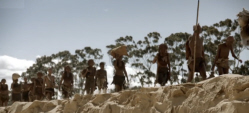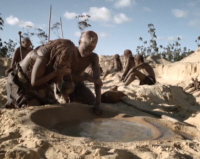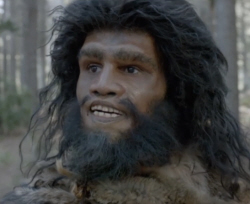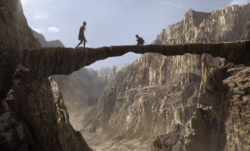Mitochondrial Eve
A Lasting Legacy
Andrew Marr's History of the World - Survival

The Long Walk
Africa, around 70,000 years ago. These people are fully developed modern humans, just like us, Homo sapiens it means "wise man".
As hunter-gatherers we were driven by familiar basic needs food, water, shelter. And for over 100,000 years, we'd been changing, adapting and
struggling to survive. Climate was a big part of this the Earth shivered its way through ice ages, the skies were darkened by vast volcanic eruptions,
the planet grew hotter and drier, and then colder and wetter again, and each change challenged mankind to finding new ways to survive.
Those who did survive emerged tougher, cleverer and better organised.
And in this particular tribe, there was someone special. She was part of one small group of probably fewer than a thousand people, slowly moving towards
the north-east coast of Africa. For early people, life really was a journey. It was an endless trek after game and fruit and seeds. Settle down, call
anywhere home, and you would starve to death.
Criss-crossing Africa over tens of thousands of years, dealing with the changing climate and animals rather bigger and faster than they were,
people learned the essentials of survival language, clothing and cooked food
And, above all, working together to stay alive.
Africa nourished us, but she was always difficult and always dangerous.

Arabian Arrivals
Over tens of thousands of years there's evidence that other tribes made the same dangerous journey out of Africa. But after studying the
evolution of human DNA, scientists have concluded that only one tribe lasted long enough outside Africa to leave a lasting legacy. This is the
tribe that made it. They probably hopped from island to island, across what is now the Red Sea, arriving in today's Arabia at around 65,000 years
ago, and, amazing as it sounds, almost all of us alive today are related to one woman in this tribe.
Of course, we don't know her name but she was a survivor, and we could call her simply "Mother", because there is a tiny genetic mutation in
every single person alive today who isn't from sub-Saharan Africa, and scientists have tracked it back to one migration out of Africa, one
tribe, one woman. A woman who has become known as Mitochondrial Eve.
It seems impossible, but whether you're from Aberdeen or Islamabad, Tokyo or New York, Scandinavia or the Pacific Islands, she is your universal
African mother.
And the journey didn't end in Arabia because her tribe kept on moving. Step-by-step, mile by mile, generation by generation, modern humans
spread out and slowly colonised the rest of the planet.
First, we travelled east along the coast towards India and East Asia. It is reckoned that some of us may have reached Australia 50,000 years
ago. The land bridge that then connected Asia and America wasn't crossed until around 15,000 years ago, but then quickly people spread right down
through the Americas to the far south. All these journeys were slowed or accelerated by cold or heat or climate change. From the Middle East,
another branch of humans headed north-west, arriving in Europe around 45,000 years ago.
By the time we arrived in Europe we were already deeply tribal, living and co-operating together in groups much larger than families, which
was very important to our success as hunters, but it had another side. Our tribal loyalties meant we had an ingrained hostility to outsiders
anyone who looked a little different, spoke differently, dressed differently or perhaps even smelt differently.

Neanderthal Man
Truer still of people who really WERE different because when we got to Europe, we discovered that we were not alone. Another variety of
human had been living here for an almost unimaginable period of time
The Neanderthals. Stocky and tough they'd survived ice-age conditions
we can barely comprehend and now they faced a rather more dangerous challenge us.
Scientists argue about this but we probably co-existed with the Neanderthals in Europe for between 5,000 and 10,000 years, and during that
time the Neanderthals went into rapid decline.
Nobody knows for sure what happened to them. They were tough survivors who'd been around for at least 250,000 years rather longer than we've managed.
It's probable that we pushed them out of their hunting grounds. It's also possible, I regret to report, that we liked to eat them.




